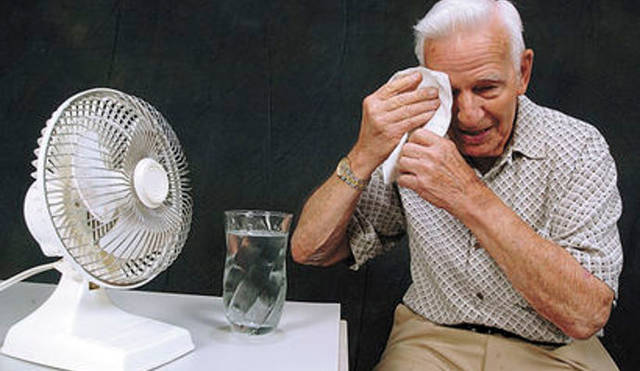
PREBLE COUNTY — Too much heat is not safe for anyone. It is even riskier if you are older or have health problems. It is important to get relief from the heat quickly. If not you might begin to feel confused or faint. Your heart could become stressed and stop beating.
Being hot for too long can be a problem. It can cause several illnesses, all grouped under the name hyperthermia:
• Heat syncope is a sudden dizziness that can happen when you are active in hot weather. If you take a heart medication called a beta blocker or are not used to hot weather, you are even more likely to feel faint. Rest in a cool place, put your legs up, and drink water to make the dizzy feeling go away.
• Heat cramps are the painful tightening of muscles in your stomach, arms, or legs. Cramps can result from hard work or exercise. Though your body temperature and pulse usually stay normal during heat cramps, your skin may feel moist and cool. Find a way to cool your body down. Rest in the shade or in a cool building. Drink plenty of fluids, but not those with alcohol or caffeine.
• Heat edema is a swelling in your ankles and feet when you get hot. Put your legs up to help reduce swelling. If that doesn’t work fairly quickly, check with your doctor.
• Heat exhaustion is a warning that your body can no longer keep itself cool. You might feel thirsty, dizzy, weak, uncoordinated, and nauseated. You may sweat a lot. Your body temperature may stay normal, but your skin may feel cold and clammy. Some people with heat exhaustion have a rapid pulse. Rest in a cool place and get plenty of fluids. If you don’t feel better soon, get medical care. Be careful-heat exhaustion can progress to heat stroke.
Heat Stroke – A Medical Emergency
If you have heat stroke, you need to get medical help right away. Older people living in homes or apartments without air conditioning or fans are at the most risk. People who become dehydrated or those with chronic diseases or alcoholism are also at most risk. Signs of heat stroke are:
• Fainting (possibly the first sign) or becoming unconscious
• A change in behavior – confusion, agitation, staggering, being grouchy, or acting strangely
• Body temperature over 104 degrees Fahrenheit
• Dry, flushed skin and a strong, rapid pulse or a slow, weak pulse
• Not sweating even if it is hot
Who is at Risk?
Each year, most people who die from hyperthermia are over 50 years old. Health problems that put you at greater risk include:
• Heart or blood vessel problems
• Poorly working sweat glands or changes in your skin caused by normal aging
• Heart, lung, or kidney disease, as well as any illness that makes you feel weak all over or results in a fever
• Conditions treated by drugs, such as diuretics, sedatives, tranquilizers, and some heart and high blood pressure medicines; they may make it harder for your body to cool itself
• Taking several prescriptions drugs; ask your doctor if any of your medications make you more likely to become overheated
• Being very overweight or underweight
• Drinking alcoholic beverages
How Can I Lower My Risk?
Things you can do to lower your risk of heat-related illness:
• Drink plenty of liquids, such as water or fruit or vegetable juices. Stay away from drinks containing alcohol or caffeine. If you doctor has told you to limit your liquids, ask what you should do when it is very hot.
• If you live in a home or apartment without fans or air conditioning, try to keep your house as cool as possible. Limit your use of the oven. Keep your shades, blinds, or curtains closed during the hottest part of the day. Open your windows at night.
• If your house is hot, try to spend time during mid-day some place that has air conditioning, like Preble County Council on Aging (PCCOA), library, friend’s house, or the store.
• If you need help getting to a cool place, as a friend, relative, religious group, or PCCOA for a ride. If necessary, take a taxi or call for senior transportation. Don’t stand outside in the heat waiting for a bus.
• Dress for the weather. Some people find natural fabrics, such as cotton, to be cooler than synthetic fibers.
• Don’t try to exercise or do a lot of activities outdoors when it’s hot.
• Avoid crowded places when it’s hot outside. Plan trips during non-rush hour times.
During hot weather, think about making daily visits to older relatives and neighbors. Remind them to drink lots of water or juice, as long as their doctor hasn’t recommended otherwise because of a pre-existing condition. If there is a heat wave, offer to help them go someplace cool, such as air-conditioned store/malls, libraries, or the Preble County Council on Aging (PCCOA). Monday’s through Fridays from 8 a.m.-4 p.m. PCCOA can provide transportation to a cooler place.
Article Reference: National Institute on Aging, “Hot Weather Safety for Older Adults”
To stay up to date on all of our activities, trips and senior news sign up to receive our bi-monthly newsletter the “Senior Scene.” Membership at the Senior Center is $10 a year. In addition to other benefits, members automatically receive our bi-monthly “Senior Scene” newsletter which features all our latest news and activities, additional benefits are discounts on trips and select activities. Like our Facebook Page at https://www.facebook.com/preblecountycouncilonaging/ or give us a call at 937-456-4947. Visit our fabulous new website at www.PrebleSeniorCenter.org.


